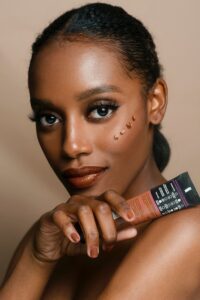“Cosmetics is probably as old as humanity.” – Renè König
Let’s dispel a myth: cosmetics isn’t limited to mere external care, because by taking care of the outside, we are also cultivating inner beauty.
Cosmetics is a general umbrella term under which we find two distinct but complementary sectors: make-up and skin care. Both are based on rigorous scientific research carried out in university laboratories.

Cosmetics and translation: the meeting of two worlds- Qontent Blog
The professional teams behind the research are also in charge of making the compositional elements work together by creating innovative, effective formulations that can also, and perhaps most importantly, be perpetually up-to-date and competitive on the market.
The cosmetics industry, highly innovative and intrinsically linked to science, invests substantially in research and development. Most companies in the sector, at the European level, spend between 1.5% and 4.5% of their annual turnover on research and innovation; in Italy, investments rise to 6%. A value well above the average of the other Italian manufacturing sectors, which invest around 4%.
COSMETICS MARKETING: STRATEGIC PRODUCT COMMUNICATION THROUGH TRANSLATION
The world of cosmetics and translation coexist and intersect on a common and fundamental focal point: culture. The beauty industry, be it make-up or skin care, is simply the representation of an ideal of beauty that expresses the cultural mind set of the particular country it operates in. Similarly, translation is not only the expression of a message conveyed in different languages—it also ends up expressing the underlying communication dynamics of different cultures.
Therefore, it is crucial to convey the same impact of the product’s claim by translating not only the composition, but also, and above all, its objective. A factor to be taken into consideration are the regulations governing the importation of products based on their INCI and the cruelty free policy, if destined for Europe or Asia.
Correctly localising the marketing of the cosmetics industry means not only knowing the correct terminology but being profoundly knowledgeable of the target culture and sector. It’s also important to be aware that a correct translation of the marketing material of a cosmetic company means crossing a thin line between scientific description and product narration.
Marketing a cosmetic product will therefore be substantially different if it is intended for countries such as India and South Korea, as the first gives greater importance to make-up, while the second has a concept of make-up that is closely related to skin care.
That’s why it is of crucial importance to rely on translation agencies with extensive experience in the sector, armed with the specific know-how to support cosmetic companies operating on the global market.



Recent Comments